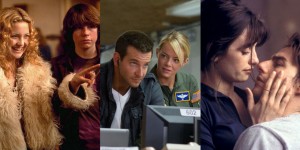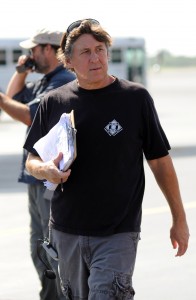
Cameron Crowe on Finding the Perfect Songs for His Movies
The acclaimed director of Almost Famous, Vanilla Sky, and the new Aloha talks about his soundtrack process and working with Led Zeppelin and Paul McCartney.
Cameron Crowe began his career as a teenage writer for Rolling Stone in its 1970s heyday, so it’s no surprise that his films incorporate music in a way that both pushes the narrative and tweaks your emotions. “When I started out as a journalist there was an almost militant feeling against the use of rock in commercials,” Crowe tells Esquire of the era. “It was all too ‘establishment,’ and most directors were rejected by the artists when they came calling for some of the iconic songs of the rock era.”
But over time, Crowe says, that attitude changed, with films and commercials sought after as a launching pad for careers or a way to generate revenue in a shifting business. “Credit Hal Ashby for bringing rock into the world of cinema,” Crowe says, referring to the New Hollywood director. “He always used songs with such care. So I’m very sensitive about corrupting the purity of a song.”
Crowe recently talked to us about how he approaches the use of music in his writing and editing process and his new film, Aloha, out this weekend, which stars Bradley Cooper, Rachel McAdams, Emma Stone, and Bill Murray, and sports an eclectic soundtrack featuring artists as diverse as Beck and the Royal Hawaiian Serenaders.
Tell me a bit about Aloha. How did you come to the story?
My mom was a schoolteacher at the Iolani school in Honolulu and I grew up with a lot of Hawaiian books and art around our house. Later, as a journalist, I was able to visit Hawaii on assignments, and always felt a strong connection to the land and to the music. It’s no mistake that the last Queen of Hawaii, before the American overthrow, was a singer and songwriter, Queen Liliuokalani, who wrote “Aloha ‘Oe.”Music is everywhere there, it’s like oxygen.
Music always plays a big part in your films. Aloha has artists most people will know, but also offbeat choices and music indigenous to Hawaii. How did you go about choosing the songs?
There was a Cyril Pahinui version of “Hi’ilawe” that I would listen to constantly while I was writing the script. Usually there’s one song that sort of sets the tone, or provides the original inspiration. That was one, along with Genoa Keawe’s amazing “Alika,” which contains some of the most incredibly long singing notes ever. After that, it’s pretty much about programming your own two-hour radio station, and making it the most memorable and eclectic mix possible. Often it’s stuff that’s been road-tested during the filming, where we’ve already shot scenes with the music playing.
Do you write or storyboard with particular songs in mind, even if you’re not sure you can secure their use?
Absolutely, I can’t help it. Often, the music I love is already a great movie: a movie that plays in your mind when you hear it. Brian Wilson’s music is very much like that. I’m always tempted to use a big chunk of Beach Boys stuff, but usually you find that Brian’s already done all the work. The music stands alone. “Feel Flows” was an exception, it became the very ending of Almost Famous. I’m really proud of that one.
Do those songs give you a window into the minds of the characters, or tell part of their story to you–or ultimately the audience–or are they more a traditional narrative device?
No, rarely are the songs a narrative device—that’s always distracting to me if I’m watching a movie and the song tells me how to feel lyrically. It’s best to go for a feeling. Often that’s how I’ve directed. “Here’s the feeling we want…” And I’ll play a song like Pete Townshend’s “Give Blood” or Parliament’s “Maggot Brain.” Or Gabby Pahinui’s “Waimanalo Blues,” which Emma plays on guitar in Aloha. Rarely do you ever want to hit a scene on the nose with words. The performance should hold hands with the music, so to speak. I’ve been recently working on a musical project with Rufus Wainwright, and he is a truly inspired collaborator. He paints a musical portrait of a feeling, never telling you how to think about the character.

On the set of Aloha. Photo by Neal Preston. ©Sony Pictures
Has there ever been any song that you really wanted for a particular scene that you were unable to secure the rights to, and if so, how did you get around it?Well, the big one was “Stairway to Heaven,” which we had filmed a seven-minute sequence around in
Almost Famous. In it, Patrick Fugit’s character plays the entire song to his mom, played by Frances McDormand. He handles it like a young Atticus Finch, presenting the case for his freedom to go on the road with a band. And we had Frances actually reacting to each of the song’s lyrics, evaluating it for subversive meaning. But when it came time to get the rights, the band said, “No, ‘Stairway to Heaven’ has become its own iconic thing, we never want to sell it or commercialize it beyond what’s already happened.” We were deflated, for about a minute, because the next thing they said was amazing: “But go ahead and use the other songs, and we’ll even throw in an extra one for free.” So we put the scene on the DVD and made it interactive—you can play “Stairway to Heaven” and sync it up at home, just like people do with Pink Floyd’s
The Dark Side of the Moon and
The Wizard of Oz. [Laughs]
Was there ever a song that you wanted to use but you felt it meant either too much to you or your audience, so that you might co-opt the meaning of it for fans of the song?
Yeah, it happens all the time. We go through a lot of music in the editing room. Often, your favorite songs, or the songs that mean the most to you, are tricky and elusive when you use them. Right now, Stevie Wonder’s “Joy Inside My Tears” comes to mind. I always admire the way David Chase or Scorsese or Tarantino use music. They usually just say, “Fuck it! Keep the song playing.” And that’s the best: When it’s just images and mostly music. “I Got a Name” in Django Unchained was genius. And Wes Anderson took the crown when he let “She Smiled Sweetly” and “Ruby Tuesday” play in their entirety, back to back, in The Royal Tenenbaums.
You started out as a diehard music fan and music journalist and developed relationships with some artists from the golden age of rock. Did that window into their world and their creative process impact the way you approach writing for scenes with music? Do it give you a different view of the emotional nature of songs?
Yes, and that’s a really good question. It’s often indelible, the effect a movie or an advertisement can have on a piece of music. But I guess it’s a case-by-case basis. For instance, I was very careful in how we used Radiohead in Vanilla Sky, and Jeff Buckley as well. I always want be able to put the vase back on the shelf in better shape than when we borrowed it.
Almost Famous was fundamentally driven by the music, but all your films use music to convey emotion. Do you rely on a music supervisor for the choices? Or do you come to your projects with a pretty clear idea of the songs you want to use?
In the past I’ve worked with Danny Bramson as a music supervisor, and very often I work directly with our editor, Joe Hutshing, on the music. We’re all big music geeks. Music supervision isn’t really an accurate title for what they do, though. It’s more like we all bring our music collections to work and we just spread all our drives and files all over the editing room and try a million things. And one thing is constant: You always know when a piece of music is right. You know it within seconds. “That’s it!” Alohahad a distinct beginning, in the slack-key style of guitar-playing that I love so much. David Crosby and Joni Mitchell both play a lot of open-tuning stuff, which is a form of slack-key. We use a rare Crosby song to pretty good effect in Aloha, I think.
Have there ever been any surprises for you in the cutting room when a song you thought would work didn’t or vice versa?
Yes, I always thought “I Will Be There When You Die” by My Morning Jacket would work in Elizabethtown. For me, it was a reason to make the movie, to use that song. It meant so much to me. But it just didn’t fit anywhere. No matter what we did. It was the same with Josh Ritter’s “Come and Find Me,” which finally found a home in Aloha. And “Wise Up” was a close call for Jerry Maguire. I loved that song, and it actually does appear in a few versions of the movie—you can hear it on the TV version and on an airplane version—because I finally figured out how to use it after the theatrical release was locked. But it took Paul Thomas Anderson and Magnolia to take it to the heights that song deserved. So that was one that kinda-sorta got away. But I just love the whole puzzle-piece aspect of it, too. Some songs are blue sky and can fit anywhere, while others are just sitting there, complex and obtuse, gloriously stubborn, until you figure out the perfect spot.
You’ve worked with so many actors, and many A-listers. Do you discuss your music choices with them? Do they ever balk or offer other choices?
I tend to work with other music lovers. We gravitate to each other. Bradley Cooper is a big music fan. He loves Neil Young and Metallica. Emma Stone is a music geek. She’s a singer-songwriter girl, and loves all eras of music. So we played a ton of stuff while making the movie. Bradley had one song that was a real trigger song, and we used it sparingly. I’d tell you which one, but I think it’s so personal to him he should probably tell you himself. There’s actually a good story attached: He came to play a character with a name very similar to the song. Maybe he’ll tell you if you run into him on the street! He also really responded to “Hunger Strike,” and requested it, and a lot of Pearl Jam. So that really took us into deeper emotional water.
Sometimes your films include songs that are–or seem–made to order for the film. For instance, Paul McCartney’s song “Vanilla Sky” was outstanding and worked really well in the film, but it also conveyed the feel of the film apart from it. How hard is that to achieve?
That song was easy. Paul McCartney had given us some music from his new album, and I just blurted that I’d love for him to write a new song for the movie. He chuckled and pointed us back to the stuff on his new album. And then a couple days later, he called Danny Bramson on the phone and said, “Tell your director to be careful what he asks for, he might just get it.” And he called us to the studio and played us “Vanilla Sky”!
Courtesy of Esquire – Jeff Slate – May 29, 2015



